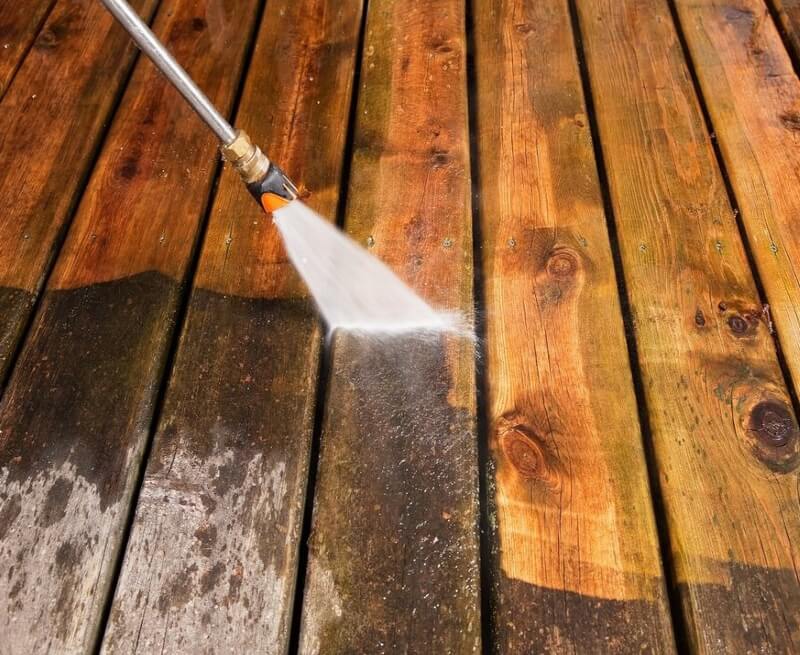
Power washing, also known as pressure washing, is a highly effective method for deep cleaning and revitalizing a wide range of surfaces. This process involves using a high-pressure stream of water to remove dirt, grime, mildew, mold, and other contaminants from surfaces. It may look simple on the surface but it’s important to understand the process of power washing, the types of surfaces that can benefit from it, and the importance of keeping surfaces power washed.
To do residential power washing, you will need a few key materials and equipment. The essentials include a high-pressure power washer, which can be either electric or gas-powered, depending on your preference and the size of the job. Additionally, you will need a supply of water, either from an outdoor faucet or a water tank. It’s also important to have a variety of spray nozzles or tips to adjust the pressure and spray pattern. Other necessary items include a cleaning solution or detergent, safety gear such as goggles and gloves, and extension cords if needed.
The process of power washing begins with a thorough assessment of the surface to be cleaned. This helps determine the appropriate pressure level, cleaning agents, and techniques required for effective and safe cleaning. Different surfaces may require different pressure settings to prevent damage, so it’s essential to consider the material and condition of the surface before starting.
Once the surface is assessed, the power washing machine is set up, and the appropriate cleaning solution is applied if necessary. The high-pressure water stream is then directed at the surface, removing dirt, grime, and other debris. The force of the water, combined with the pressure, effectively dislodges and eliminates even the most stubborn stains and contaminants.
Power washing is suitable for a wide range of surfaces. It is commonly used on exterior surfaces such as concrete driveways, sidewalks, and patios, as well as on wood decks, fences, and siding. Additionally, power washing can be used on brick, stone, vinyl, and metal surfaces, among others. The versatility of power washing makes it a valuable cleaning method for both residential and commercial properties.
Keeping surfaces power washed offers several important benefits. Firstly, power washing helps maintain the overall appearance of surfaces. Over time, dirt, grime, mold, and mildew can accumulate on surfaces, leading to a dull and unsightly appearance. Power washing effectively removes these contaminants, revealing the clean and vibrant surface underneath. This is particularly important for outdoor surfaces that are constantly exposed to the elements, as they are more prone to accumulating dirt and organic growth.
Furthermore, power washing is an essential step in regular maintenance and preventative care. By removing dirt, mold, and mildew, you prevent the buildup of these substances, which can cause long-term damage to surfaces. For example, mold and mildew can deteriorate wood, compromising its structural integrity and leading to costly repairs or replacements. Power washing helps prevent such damage and prolongs the lifespan of surfaces.
Power washing also contributes to maintaining a healthy and safe environment. Mold, mildew, and algae growth on surfaces can pose health risks, particularly for individuals with allergies or respiratory conditions. Power washing effectively eliminates these contaminants, creating a cleaner and healthier living or working space. Additionally, power washing removes slippery substances such as algae and moss from surfaces, reducing the risk of slips and falls.
Moreover, power washing surfaces before applying paint, sealant, or stain improves the adhesion and durability of these coatings. By thoroughly cleaning the surface and removing dirt and debris, the coatings can adhere more effectively, resulting in a longer-lasting and more aesthetically pleasing finish. Power washing is especially beneficial for surfaces like decks, fences, and driveways that require regular maintenance and refinishing.
In conclusion, power washing is a highly effective method for deep cleaning and revitalizing a wide range of surfaces. It involves using high-pressure water to remove dirt, grime, mold, and other contaminants from surfaces. Power washing is suitable for various surfaces, including concrete, wood, brick, and metal. Keeping surfaces power washed helps maintain their appearance, prevents long-term damage, promotes a healthy environment, and improves the effectiveness and longevity of subsequent coatings. Regular power washing is an essential part of surface maintenance and contributes to the overall cleanliness and aesthetics of residential and commercial properties.